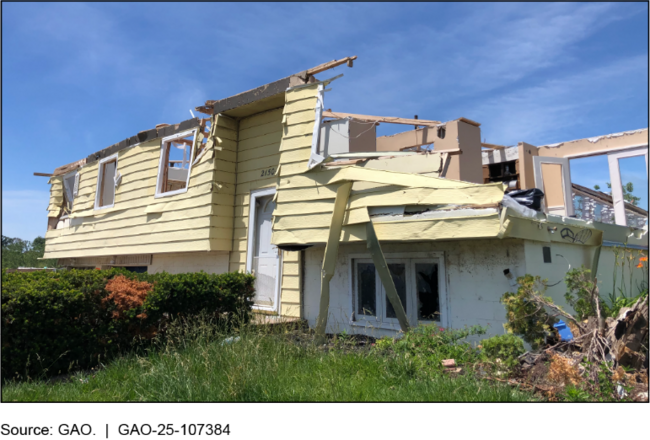Tornadoes: Agencies Promote Resilience but Actions Needed to Improve Access to FEMA Assistance
Fast Facts
Tornadoes claim more lives annually in the U.S. than hurricanes and earthquakes combined. The Federal Emergency Management Agency helps tornado survivors and communities through a variety of programs.
By law, only states and territories are eligible to receive Emergency Management Performance Grant awards directly from FEMA. States may distribute these grant awards to local governments and Tribes. However, Tribes aren't eligible to apply directly.
As a result, Tribes cannot easily access assistance that may help them plan and prepare for disasters, including tornadoes. Our recommendations address this and other resource access issues.
Tornado Damage to a Home

Highlights
Why This Matters
Tornadoes claim more lives annually in the U.S. than hurricanes and earthquakes combined. In 2024, there were more than 2,100 tornadoes in the U.S., the highest annual total on record dating back to 1950. FEMA helps tornado survivors and communities through a variety of programs.
GAO Key Takeaways
The President approved 94 major disaster declarations involving tornadoes, in fiscal years 2019 through 2024. For those disasters, FEMA has obligated $2.8 billion for Public Assistance and the Individuals and Households Program, as of December 2024.
FEMA also assists tribal, state, local, and territorial governments through its Emergency Management Performance Grant program. This program is the primary source of federal support for developing and maintaining emergency management expertise. It pays for salaries and provides resources related to hazard preparation.
Per statute, only states and territories are eligible to receive Emergency Management Performance Grant awards directly from FEMA; Tribes are not eligible to apply directly. States may distribute grant awards to local governments and Tribes.
From fiscal years 2014 through 2023, 17 states did not distribute any awards to Tribes within their state.
When communities cannot access assistance to build emergency management capacity, it could mean not being able to plan and prepare for a disaster, such as a tornado.
In April 2023, FEMA submitted a legislative proposal to Congress outlining several possible solutions that would enable tribes to more easily access this funding. Congress has not yet acted on FEMA’s legislative proposal, as of August 2025.
A Home in Nebraska Damaged by A Tornado in April 2024

How GAO Did This Study
We analyzed FEMA data on tornado disasters from 2019 through 2024. We also visited four states, and interviewed emergency management officials from seven counties and two Tribes impacted by tornadoes during that span.
Recommendations
We are recommending that Congress consider creating a new program or amending an existing program to provide grants directly to tribal governments to build emergency management capacity. We are also making three recommendations to FEMA to improve access to assistance.
Matter for Congressional Consideration
| Matter | Status | Comments |
|---|---|---|
| Congress should consider amending an existing program or creating a new program to provide grants directly to tribal governments for building emergency management capacity. In taking such action, Congress could find helpful GAO's prior work identifying program characteristics that can create barriers to tribal participation in federal programs. (Matter for Consideration 1) | When we confirm what actions the agency has taken in response to this recommendation, we will provide updated information. |
Recommendations for Executive Action
| Agency Affected | Recommendation | Status |
|---|---|---|
| Federal Emergency Management Agency | The FEMA Administrator should identify Tribal Nations' needs for emergency management capacity building, including the extent to which any identified needs are being met. After completing the study, the FEMA Administrator should outline steps the agency plans to take, with timeframes, to address any findings. (Recommendation 1) |
When we confirm what actions the agency has taken in response to this recommendation, we will provide updated information.
|
| Federal Emergency Management Agency | The FEMA Administrator, in coordination with the Small State and Rural Advocate, should identify and implement ways to improve flexibility in Public Assistance program guidance for small states and rural communities. (Recommendation 2) |
When we confirm what actions the agency has taken in response to this recommendation, we will provide updated information.
|
| Federal Emergency Management Agency | The FEMA Administrator should identify and implement strategies to ensure Public Assistance Program Delivery Managers are knowledgeable of program policies and consistently apply them when providing support to Tribes, states, and localities. (Recommendation 3) |
When we confirm what actions the agency has taken in response to this recommendation, we will provide updated information.
|
